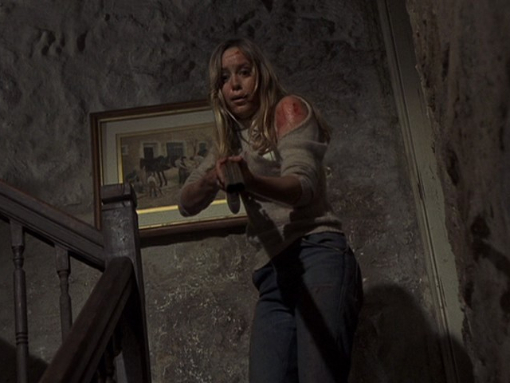Midnight Cowboy

See more details, packaging, or compare
Synopsis
One of the British New Wave’s most versatile directors, John Schlesinger came to New York in the late-1960s to make Midnight Cowboy, a picaresque story of friendship that captured a city in crisis and sparked a new era of Hollywood movies. Jon Voight delivers a career-making performance as Joe Buck, a wide-eyed hustler from Texas hoping to score big with wealthy city women; he finds a companion in Enrico “Ratso” Rizzo, an ailing swindler with a bum leg and a quixotic fantasy of escaping to Florida, played by Dustin Hoffman in a radical departure from his breakthrough in The Graduate. A critical and commercial success despite controversy over what the MPAA termed its “homosexual frame of reference,” Midnight Cowboy became the first X-rated film to receive the best picture Oscar, and decades on, its influence still reverberates through cinema.
Picture 9/10
John Schlesinger’s Midnight Cowboy receives a new Blu-ray edition courtesy of the Criterion Collection, making use of a new 4K restoration. The film is presented with a 1080p/24hz high-definition encode on a dual-layer disc in the film’s original aspect ratio of 1.85:1. The new restoration comes primarily from the 35mm original camera negative, though a 35mm interpositive was used to fill in where the negative was too heavily damaged.
The notes do state that a 35mm theatrical print created for the film’s “2004 twenty-fifth anniversary” (I’m going to assume they meant “thirty-fifth” anniversary there) and supervised by Schlesinger, producer Jerome Hellman, and cinematographer Adam Holender was used for colour correction. I actually have little doubt that this is how the film is supposed to look but it does look a bit different compared to the previous MGM Blu-ray and DVD editions. Scenes can be a bit more distinct colour wise, some taking on a more blu-ish/green tint while others can take on a warmer, or more natural look, depending on what the film calls for. Despite this colour saturation is still excellent, even the dirty browns and grays looking sharp. Some of the shirts Joe Buck wears offer brighter offerings, blues or reds mostly, and they manage to pop, and a fantasy sequences of Rizzo’s (where the two are in Florida) looks just brilliant, the brightest most lively looking part of the film. Black levels are strong but some dark sequences, especially in Rizzo’s apartment, do lack detail but this appears to be inherent in the original photography and is still similar to how the scenes looked in previous releases.
Detail is superb, this presentation being the sharpest I have yet seen the film. “Quality” can degrade in shots but that has more to do with the stylish nature of the film and its editing, mixed with either underexposing or overexposing the negative and even jumping between film stocks (the party scene makes use of what is either 16mm or 8mm film). This also leads to varying grain levels, going from “quite noticeable” to “in-your-face” but it always remains clean and natural, never noisy or blocky. It really looks like a projected film throughout and this aspect alone probably marks the biggest improvement over the previous MGM releases.
Also better, and by a fairly significant portion, is the restoration work. There is some noticeable discoloration in sections of the frame during the opening, and there are some marks present during the heavily stylized party sequence, but there is little doubt the damage present during this portion of the film is intentional. The rest of the film has been remarkably cleaned up, though, all of the scratches and marks present in the previous MGM Blu-ray and DVD editions now gone.
Overall I thought it was a thing of beauty. It’s sharp and clean, retaining its grainy look and looking like film. Really superb.


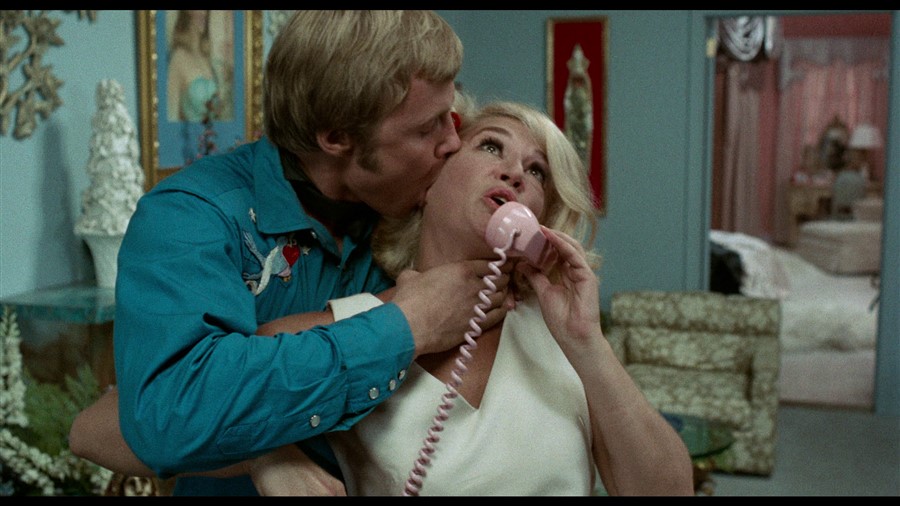
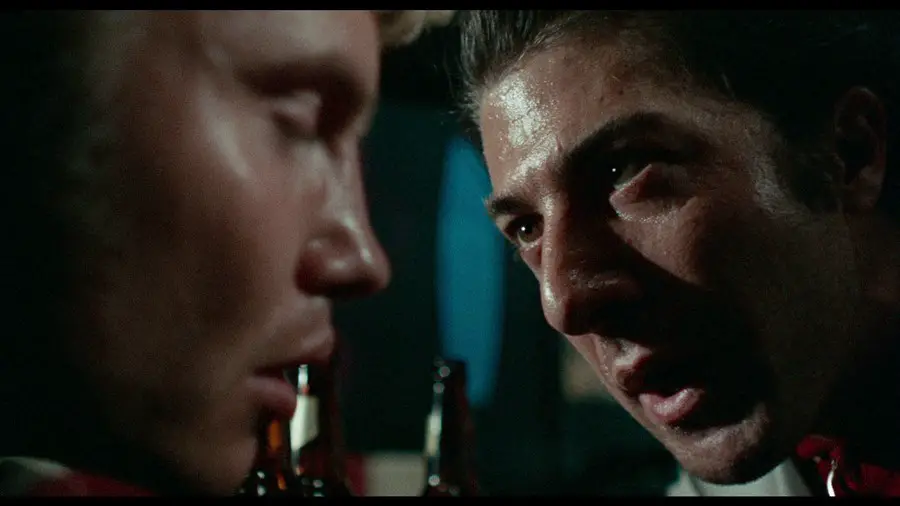





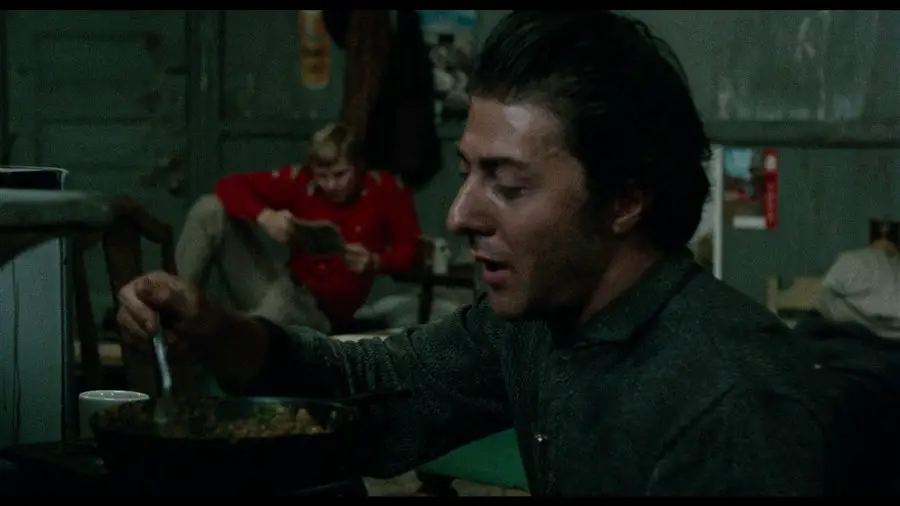



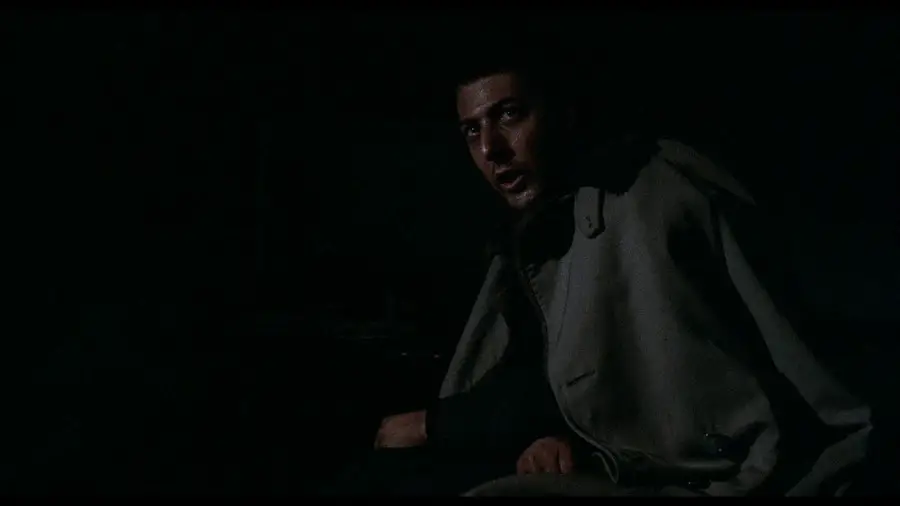





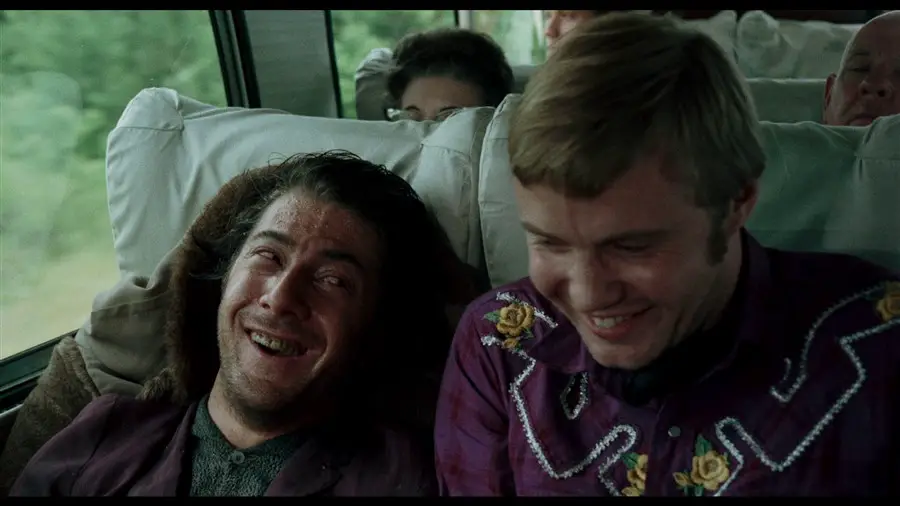




















Audio 7/10
Criterion includes both the film’s original monaural presentation and the 5.1 remix, respectively presented in 1.0 PCM and DTS-HD MA. I watched the film in mono first and then planned on sampling the 5.1 track but ended up just watching the whole film again. At any rate both options are good but the purists will more than likely stick with the mono track. Thankfully it sounds to have been restored thoroughly, with no noise or damage in the background while also offering a fair bit of range with some impressive highs and lows and superb fidelity.
I was rather surprised by the restraint of the 5.1 track on the other hand, and I think it will still be a viable option for many. The opening does get a bit showy, with voices jumping between speakers, but outside of that most everything is focused to the center, some effects and music spreading nicely out to the other areas of the sound field. But it doesn’t overdo it or try to force things, like the 5.1 track for The Graduate did, even the party sequence, where some aggressive mixing would have certainly been reasonable, keeps itself restrained.
In terms of quality they both sound really sharp, though the music sounds a bit more dynamic in the 5.1 track. Ultimately both sound excellent and it will come down to personal preference.
Extras 9/10
Criterion also bests MGM’s previous special editions in the area supplements, loading up a number of features onto here, including most of the material found on the previous releases. First is an audio commentary featuring director John Schlesinger and producer Jerome Hellman, recorded in 1991 for Criterion’s LaserDisc edition (and I don’t believe it has been available since). The two appear to have been recorded separately and then edited together, which was a common practice for Criterion’s commentaries at the time. It’s a very in-depth discussion about the film’s production but it’s a pretty refreshing one, the participants being very forthcoming, even clarifying some things that are a bit cryptic in the film, while Schlesinger even criticizes (if mildly) his own film when he isn’t complaining about the heat he had to endure while shooting in New York during the summer. He is critical of the stylized nature of it, which he says was written into the script, and seems to now wish he simplified things a bit (and he also feels the party sequence is too long). The two also talk about some minor difficulties with crew members (Hellman seemed especially annoyed by a camera operator) and talk about the various reactions to the film, which were mostly good but there frustrated by criticisms that the film wasn’t overtly critical, addressing subjects like the Vietnam War.
Criterion doesn’t include the solo Hellman track found on the previous MGM editions, though it’s not a big loss: it was fine, but the same material is pretty much covered there as here and has more dead space. I’m happy Criterion dug this one back up, especially since it is the only feature that Schlesinger prominently appears in on this release. It’s also beautifully edited to keep the pace going and lacking significant dead spots.
A couple of exclusive features are up next. First is an audio interview with Schlesinger’s life partner Michael Childers, a photographer who was around for most of the production of Midnight Cowboy and documented it through photographs. Over the photographs he shot (which include photos from planning sessions, rehearsals, and even from the shoot itself) Childers recounts these moments, usually ones related specifically to the photos being shown, with an obvious fondness. What’s most valuable about this, though, is that he does expand on subjects covered in the commentary (and covered in the other features) talking a bit more about the film’s famous song and the alternate ones recorded (I guess this has been documented elsewhere but I actually didn’t know Bob Dylan’s “Lay Lady Lay” was written for this film), and then gets into even more detail about how Paul Morrisey and Andy Warhol and their gang got involved in the party sequence (which Warhol was apparently supposed to appear in but plans changed after an unfortunate incident he had with Valerie Solanas). Childers appears in other features on here, made for previous editions for the film, but the material given here, including his own personal recollections about his relationship with Schlesinger, is unique and just wonderful. It runs 14-minutes.
Also wonderful is the next exclusive feature, a video essay on the look of the film by cinematographer Adam Holender. For 25-minutes he talks over many sequences in the film, explaining how the differing looks for sequences in the film were achieved, along with the technical difficulties that arose, particularly in the area of lighting when shooting night scenes on the streets, hampered by the fact they were shooting guerilla style a lot of the time and couldn’t bring their own lighting. Schlesinger of course talks about this in the commentary but Holender fills in a lot of the gaps and it proves to be a very rewarding addition to the release.
A 9-minute 1969 short about the film’s production called The Crowd Around the Cowboy next pops up. It provides some behind-the-scenes footage of the shoot though focuses a lot on the crowds that gathered around to see a film being made. This ends up being highly amusing, especially from the more elderly members of the crowd, one woman absolutely fascinated by the tall Jon Voight. It ends up being a fairly light feature but it’s quite a bit of fun.
Criterion then carries over the two documentaries from the previous MGM special editions, putting them under the section 35th Anniversary Documentaries: After “Midnight”: Reflecting on a Classic 35 Years Later and Controversy and Acclaim, running 30-minutes and 10-minutes respectively. After is of course a making-of, featuring members of the cast and crew (including Voight and Hoffman) talking about the production, while the other documentary looks at the film’s X-rating and its eventual Oscar win. They’re probably about what you expected from studio produced featurettes but they’re still thorough and both breezy enough.
Next are a couple of features revolving around John Schlesinger including excerpts from a 2000 interview with the filmmaker recorded for BAFTA Los Angeles. The excerpts feature the director explaining how he presents homosexuality in his films, which basically comes down to it not being a big deal so he’d rather not make a big deal about it in his work. Midnight Cowboy and its central friendship comes up (which he attributes to the film’s longevity) but the discussion focuses more on Sunday Bloody Sunday. This runs 15-minutes.
There is also a rather loving BAFTA Tribute for Schlesinger found here, which features United Artists’ former president David Picker, joking about having to let a director do whatever they want after making them a hit (this of course references Sunday Bloody Sunday), and actors Jon Voight and Dustin Hoffman, both recounting what it was like being directed by the man. Hoffman attributes his “I’m walkin’ here!” improv (after almost getting run down by a cab) to being worried about Schlesinger yelling at him for ruining a shot and Voight recounts the long road to getting the part of Joe Buck, among other things. It’s hard to tell what is true or not (and Voight even acknowledges this when he’s telling an anecdote) but it’s another fun feature and a fairly quick 32-minutes.
Some material central to Jon Voight pops up next, including his audition footage that is mentioned a lot throughout the other features (including clips in the one MGM documentary), featuring Voight talking with someone offscreen in character, with his still-rough accent. This is accompanied by an interview with him on The David Frost Show, filmed in 1970. This one is especially good as Voight talks about how he got into acting at a young age and his stage work through the years. It runs 14-minutes.
One of the gems of this edition, though, is the 57-minute 1990 documentary about the career of the film’s screenwriter, Waldo Salt: A Screenwriter’s Journey. Narrated by Peter Coyote and featuring interviews with those that had worked with him through the decades, including actors Jon Voight, Dustin Hoffman, and Robert Redford, as well as archival interviews with Salt, it works a lot like a classic “overcoming the odds” tale, Salt having to battle being blacklisted in Hollywood (after being “named” by his best friend of all people!) and then dealing with his own self-doubt after being able to write under his name again (he wrote the scripts for a handful of awful films). He then finally “beats the odds” when he was brought in to do the screenplay for Midnight Cowboy. This ends up being a rather arresting biography program of the man, choosing not to simply give a by-the-numbers account of his life but instead striving to understand him and how his life experiences have made it into his screenplays. It’s one of the better put together documentaries of this type that I’ve seen and a really wonderful inclusion.
The disc then closes with a theatrical trailer (though it looks more like either a re-release trailer or one made for a then-upcoming home video release) and the included insert includes a nicely rounded though surprisingly short essay by Mark Harris (I would have actually expected a booklet with a lot material so this aspect proves a bit disappointing).
Though the influence of the film is touched upon I still would have expected some more academic features looking at the film’s impact but as it is Criterion has still put together a far more satisfying special edition for the film than what MGM did previously.
Closing
A far superior edition to what MGM released, offering a far more filmic presentation and some strong supplemental material. An easy recommendation.






